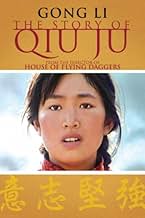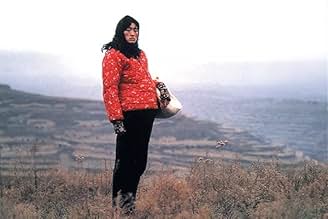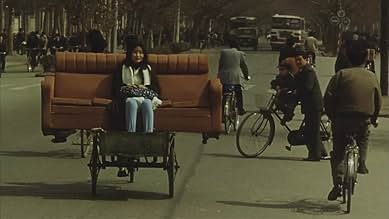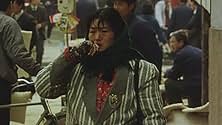IMDb RATING
7.5/10
7K
YOUR RATING
A peasant woman seeks justice after the headman of her village has kicked her husband in the groin.A peasant woman seeks justice after the headman of her village has kicked her husband in the groin.A peasant woman seeks justice after the headman of her village has kicked her husband in the groin.
- Awards
- 19 wins & 9 nominations total
- Director
- Writers
- All cast & crew
- Production, box office & more at IMDbPro
Featured reviews
Probably my least favorite Zhang Yimou film. Oh, it's not bad. It's pretty good, to tell the truth. But it's the kind of film where you get the point right away and you have to spend 100 minutes watching the filmmaker stumble toward the foregone conclusion. Gong Li plays the title character, a hugely pregnant woman. Her husband just got kicked in the nuts by their farming community's chief, and Qiu Ju wants an apology. Unfortunately, none of the officials she takes the case to can actually force the guy to apologize. They can make him dole out monetary compensation, but that's not good enough for Qiu Ju. Every time she doesn't get the results she wants, she attempts to go to a higher level of authority. It's an amusing situation, but the film kind of plods along slowly. I won't demand Zhang Yimou stick to his wonderful visual talents, but it is disappointing how mundane this film looks and feels. The worst crime perhaps is that Gong Li isn't given much acting to do. I love the final look on her face when the film ends, but I think pretty much anyone could have played Qiu Ju. I know, it sounds like I hated it, but I didn't. I just wasn't overly impressed with it, despite its obvious qualities.
This is a small thing, but ripe, all about learning to naturally go out among life.
This is is first in the story. A wife demands to know why her husband was kicked "where it hurts" by a local official. Why did he do it? She ventures out in the village, then down in the city in search of answers. The tip of the thread that humorously guides us through different faces so that altogether we get a snapshot of Chinese life.
A constable arbites and gives his verdict, which seems perfectly reasonable, the accused will cover medical expenses and both parties are made aware that they were both wrong. But the wife is not pleased, she wants a more significant justice, and will go through the state apparatus looking for it.
This has led some viewers to think that we're meant to be seeing an individual being caught in the gears of an absurd and uncaring bureaucracy; that seems to be a handy interpretation we have in the West ever since Kafka. But that's not the point being made here.
Party officials, whenever encountered, are always benevolent and trying to be fair, quietly exasperated by the antics of the people in their charge. A higherup is kind enough to drive her back to the hotel on his car, another one stoically returns someone's stray animal. You can see why this among Zhang's early work was not banned over there.
But every new verdict from higher offices remains the same however, which is to say, the world is just so, maybe not ideal. Why make a fuss about why we do things, why stand so rigidly? There's no deeper reason sometimes and we're better off mending ourselves by moving forward, going along unconstrained by "right" and "wrong". This is often hard to translate to someone in the West because we have made ourselves stupid by arguing from principle instead of seeing what the specific thing in front of us calls for now.
And the notion of contrived uncontrivance extends in everything else. Zhang is aiming for a snapshot of life whereby we just mingle with things, what they used to call "neorealism" back in the day. The view it ventures to offer will be precious, a heartland generally closed to us.
More pertinently for me, it evokes a view of life, a warmth and sense of community I like. Lovingly obstinate in trying to fathom its tempests, pettiness without malice, quiet perseverance in simple things. Zhang lets all of this envelop in a natural way, as impulse that climbs up through the soles of the feet.
Gong Li is perfectly in tune with this, sublime in erasing any trace of an actor's face behind the shawl, making herself like a stump of uncontrived urges. We're meant to see that though a kind person, she's also a little dull in her fixation to an apology. And look how naturally she comes forth from her body, then watch her as the nervous empress in Golden Flower. What a range in which she moves freely.
This is is first in the story. A wife demands to know why her husband was kicked "where it hurts" by a local official. Why did he do it? She ventures out in the village, then down in the city in search of answers. The tip of the thread that humorously guides us through different faces so that altogether we get a snapshot of Chinese life.
A constable arbites and gives his verdict, which seems perfectly reasonable, the accused will cover medical expenses and both parties are made aware that they were both wrong. But the wife is not pleased, she wants a more significant justice, and will go through the state apparatus looking for it.
This has led some viewers to think that we're meant to be seeing an individual being caught in the gears of an absurd and uncaring bureaucracy; that seems to be a handy interpretation we have in the West ever since Kafka. But that's not the point being made here.
Party officials, whenever encountered, are always benevolent and trying to be fair, quietly exasperated by the antics of the people in their charge. A higherup is kind enough to drive her back to the hotel on his car, another one stoically returns someone's stray animal. You can see why this among Zhang's early work was not banned over there.
But every new verdict from higher offices remains the same however, which is to say, the world is just so, maybe not ideal. Why make a fuss about why we do things, why stand so rigidly? There's no deeper reason sometimes and we're better off mending ourselves by moving forward, going along unconstrained by "right" and "wrong". This is often hard to translate to someone in the West because we have made ourselves stupid by arguing from principle instead of seeing what the specific thing in front of us calls for now.
And the notion of contrived uncontrivance extends in everything else. Zhang is aiming for a snapshot of life whereby we just mingle with things, what they used to call "neorealism" back in the day. The view it ventures to offer will be precious, a heartland generally closed to us.
More pertinently for me, it evokes a view of life, a warmth and sense of community I like. Lovingly obstinate in trying to fathom its tempests, pettiness without malice, quiet perseverance in simple things. Zhang lets all of this envelop in a natural way, as impulse that climbs up through the soles of the feet.
Gong Li is perfectly in tune with this, sublime in erasing any trace of an actor's face behind the shawl, making herself like a stump of uncontrived urges. We're meant to see that though a kind person, she's also a little dull in her fixation to an apology. And look how naturally she comes forth from her body, then watch her as the nervous empress in Golden Flower. What a range in which she moves freely.
Really enjoyed this one. Qiu Ju is the wife of a man who has been kicked by a neighbor, his village chief. She presses for an apology, largely (if subtitles do it justice) because, even though his chest is what hurts longer, he's been kicked in the "privates" and she wants more than one child. She takes her quest for the apology up the chain of officialdom.
I couldn't get enough of the scenery - houses, city, carts, clothes, painted paper banners, dried peppers and corn - and the faces of people. As other viewers noted positively, the people in it didn't seem to be actors but real people, caught up in daily affairs and catching us up, too. The nearby village is somewhat familiar to her, but her trip to the city may have been her first. Watching her trying to find her way around, haggling for fair rates and help from a produce buyer, a bike-cart driver, a letter writer, a hotelier, and a lawyer was a lot of fun. Her trips seemed like a great introduction to the culture.
One of the things I loved was how the families and neighbors kept having complex interactions with each other throughout the ordeal. And the social roles in this were interesting: Farm/village chief to farmer, sister to sister, daughter-in-law to her in-laws, Party officials to their hierarchy and to citizens, country to city, women's role in general (as in what sex babies are preferred) and the strong stance of a specific woman like Qiu Ju, who seemed to be empowered as much as frustrated by the system and by her family and neighbors.
I read reviews of this as a negative comment on bureaucracy. If so, it showed a remarkably humane one. Flaws were on display but the overall tone was of acceptance.
The sudden ending left me feeling for the main characters. I seemed to see a judgment in it, but wasn't sure what that judgment was. I wanted to know how the story was interpreted in China, so I came to IMDB to at least see how others took it.
I couldn't get enough of the scenery - houses, city, carts, clothes, painted paper banners, dried peppers and corn - and the faces of people. As other viewers noted positively, the people in it didn't seem to be actors but real people, caught up in daily affairs and catching us up, too. The nearby village is somewhat familiar to her, but her trip to the city may have been her first. Watching her trying to find her way around, haggling for fair rates and help from a produce buyer, a bike-cart driver, a letter writer, a hotelier, and a lawyer was a lot of fun. Her trips seemed like a great introduction to the culture.
One of the things I loved was how the families and neighbors kept having complex interactions with each other throughout the ordeal. And the social roles in this were interesting: Farm/village chief to farmer, sister to sister, daughter-in-law to her in-laws, Party officials to their hierarchy and to citizens, country to city, women's role in general (as in what sex babies are preferred) and the strong stance of a specific woman like Qiu Ju, who seemed to be empowered as much as frustrated by the system and by her family and neighbors.
I read reviews of this as a negative comment on bureaucracy. If so, it showed a remarkably humane one. Flaws were on display but the overall tone was of acceptance.
The sudden ending left me feeling for the main characters. I seemed to see a judgment in it, but wasn't sure what that judgment was. I wanted to know how the story was interpreted in China, so I came to IMDB to at least see how others took it.
When her husband insults a neighbor and is nearly 'emasculated', a peasant woman goes to great lengths to secure justice. Many people in the West may not understand why this woman is so determined to right such a 'minor' wrong. In Chinese culture, an assault on another man's "honor" is not viewed as a 'minor' thing; having children is very important and carries a greater social significance than it does in the West. It is expected of every man, and having a son, especially, to work in the fields for the good of the family and carry on the family name, has been worshipped as a Confucian ethic for centuries. China is still very much a paternalistic society (despite Communist reform),and the 'one child' policy has only reinforced the old Chinese adage that "if you bear a girl,bear a beautiful one, if you bear a son, bear an intelligent one." So understandably,from the viewpoint of Qiu Ju,not only does her husband suffer but her entire family name and honor suffers too, when the man is attacked in a 'sacred place', his gonads. The village chief, the fellow who delivered the disabling kick,has also been dishonored by the husband's insult about "having hens" and not boys. By kicking the offending man in the balls, the village chief wanted to save his face, hence the stalemate. But for Qiu Ju, and certainly in Chinese eyes, the greater wrong is the assault on her husband's reproductive organs. A delightful movie, so well acted with quite a few funny moments surrounding a serious issue. Zhang Yimou is one fine director.
10jtur88
I've visited rural China, and this is the most realistic film I have ever seen. I was awestruck at how well this film captures exactly the China that a modern visitor to the country would see. Not just the landscapes---the people are portrayed just as they are. I carry a copy of this film with me to show my friends and family--I know of no better way to illustrate the China that I actually saw. In addition, as a film-goer, I loved this film for its austere simplicity of production. I found myself wondering how many of the people who appeared on the screen were actually actors---as opposed to just having a candid camera imposing itself into their daily lives. I loved the scene in the office where an official was issuing a marriage license to a young couple---this was a spine-tinglingly poignant scene that, to me, underscored the genuine humanity that would seem so impossible in such a country---a humanity that is real. The Chinese are lovely, gentle people, and it was a delight to see a film that accurately reflects this character.
Did you know
- TriviaThe Chinese title is "Qiu Ju Files a Lawsuit"
- How long is The Story of Qiu Ju?Powered by Alexa
Details
Box office
- Gross US & Canada
- $1,890,247
- Opening weekend US & Canada
- $25,785
- Apr 18, 1993
- Gross worldwide
- $1,890,247
- Runtime
- 1h 40m(100 min)
- Color
- Aspect ratio
- 1.85 : 1
Contribute to this page
Suggest an edit or add missing content











